Salt Spring Coffee tackles climate change with ROC coffee
Canada’s first Regenerative Organic Certified coffee returns to Natural Products Expo West ahead of its U.S. retail debut. Learn more about brand’s caffeinated mission.
February 14, 2024
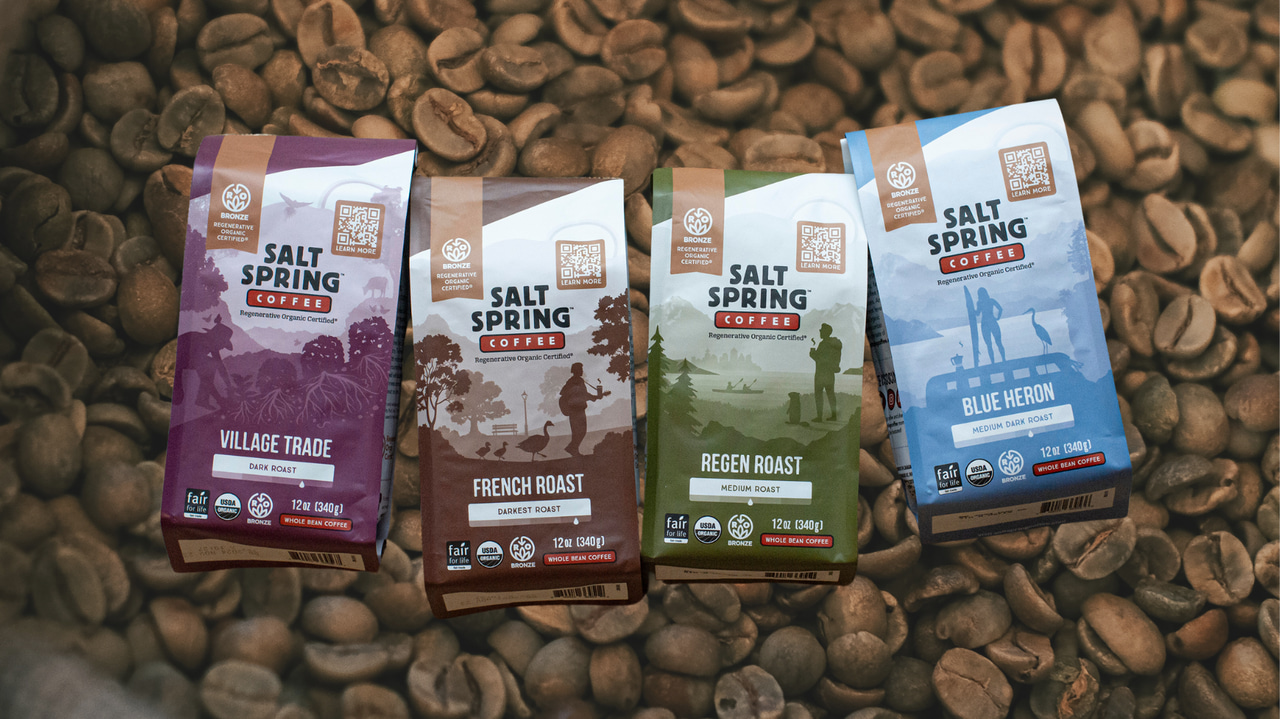
Natural Products Expo West’s Fresh Ideas Organic Marketplace is a one-day-only, farmers market-type event. New Hope Network spotlights a few of these brands to give buyers a taste of what they can find.
The climate emergency can’t wait.
Mickey McLeod, co-founder and CEO of Salt Spring Coffee, maker of Canada’s first Regenerative Organic Certified coffee, wants to do something about it.
To call attention, Salt Spring Coffee, which is based in British Columbia, launched a provocative ad campaign that drops a few F-bombs and has captured the attention of many.
“Our message is about the climate emergency,” McLeod says. “Proper regenerative agriculture can sequester carbon, so it pulls it out of the atmosphere back into the soil, but you need to have things growing on that land to do that.”
The company’s shares on social media have touted: “Coffee sucks if it isn’t grown by regenerative farming. F- coffee, if it doesn’t empower coffee farmers. We loathe coffee, if it doesn’t support fair trade supply chains.” On Instagram, a video shows a man awakening from a time capsule in the year 2050. After being told disease has been eradicated, taxes no longer exist and cars can fly, the man is told coffee has gone extinct. “The future sucks,” he says while climbing back into a time capsule. A banner soon plays with the statement: “By 2050 climate change could make coffee extinct. We're fighting for it today with regenerative farming. Salt Spring Coffee. Infinitely good coffee for an infinitely better tomorrow.”
The bold ad campaign aims to highlight the importance of sustainable agriculture, raise awareness about how climate change is affecting coffee production and highlight the company’s strong belief that the coffee industry should prioritize the well-being and empowerment of farmers who grow coffee beans, McLeod says.
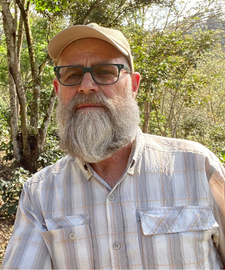
Mickey McLeod, co-founder and CEO of Salt Spring Coffee, Canada’s first Regenerative Organic Certified coffee,
“We are a pretty true-blue company that really does care about the environment,” says McLeod, who co-founded Salt Spring Coffee in 1996 with his wife, Robbyn Scott. “It’s got nothing to do with coffee. It’s got to do with humanity and what we need to do relatively quickly.”
Salt Spring Coffee, a Certified B Corporation, sells its organic, fair-trade coffee in 1,500 locations across Canada, including 36 Costco stores in Western Canada, plus Sobeys, Loblaws, Metro, Safeway and Save-On-Foods, as well as many smaller independents.
Salt Spring Coffee has pledged to be zero waste by 2026. Here’s what else is important to know.
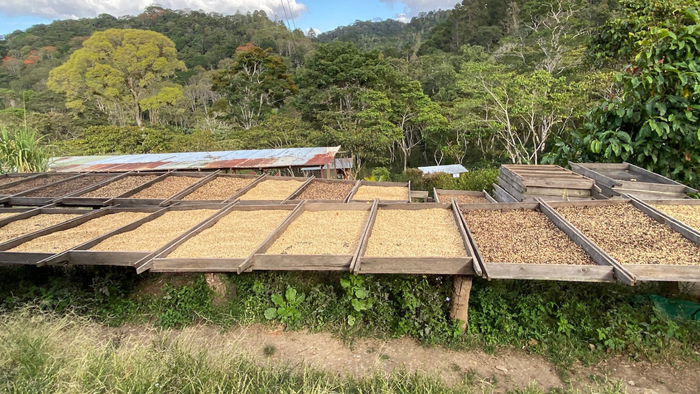
Salt Spring Coffee dries on raised beds in Canada.
How have consumers reacted to your bold ad campaign?
Mickey McLeod: It’s been [met] with mixed reaction. People really liked that little video. And pardon the language, but “F- coffee if you don’t support farmers.” It’s sort of the reality that we’ve got to deal with these things. We’ve got to be aware and support farmers.
What’s one of the bigger problems?
MM: To be very honest, the problem is consumers are not paying enough for coffee. In Canada, we sell a bag of our coffee, which is 14 ounces, for an average of $17 or $18 on the grocery store shelf. That’s pretty darn cheap because we’re paying fair-trade premiums, organic premiums. Even at the price the farmers get paid, they’re barely making any might. It’s really tight for us. We should be charging a lot more.
But consumers have been allowed to, or the market has been allowed to, say it’s too expensive. For some reason, coffee, at least in the world we work in, is really undervalued. It’s really challenging to get people to understand really what it’s worth.
At what point did you incorporate regenerative agriculture?
MM: We’ve been working at it for 2.5 years. I’ve been aware of it for quite some time. We became involved with Regenerative Organic Certified because it ties into our message that if we don’t take care of the environment, there’s not going to be any coffee left.
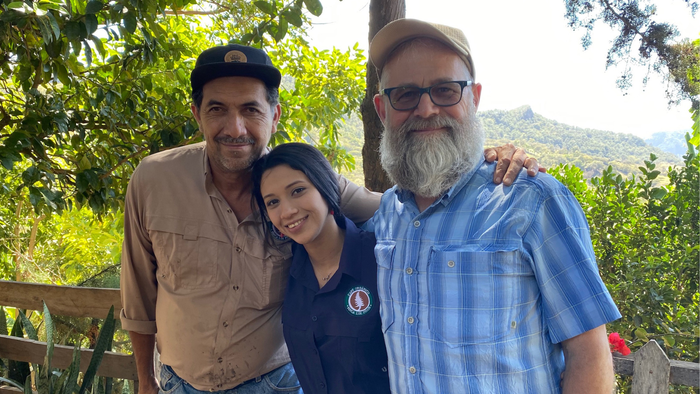
Coffee farmers Byron and Sara Corrales pose with Mickey McLeod, co-founder and CEO.
What has the transition to regenerative agriculture been like for the farmers?
MM: Coffee is a little bit different because it’s considered agroforestry, so it does have shade cover. A lot of the coffee producers we work with, the cooperatives, have already been doing these practices for years. When they became ROC certified, it was fairly easy.
Why is regenerative agriculture important to you and Salt Spring Coffee?
MM: The real value and importance of regenerative agriculture is about soil health and making sure that all the ground has some kind of crop cover. You always have the ground covered with something. Part of the mission of Salt Spring Coffee is not only working with our coffee supply chain to get certified and be aware, but to help spread the word about regenerative agriculture and its importance.
What’s your advice to others who want to know more about regenerative agriculture?
MM: Everyone should watch the documentary “Common Ground.” We were one of the hosts and spoke on a panel about it when it was in Vancouver. The prequel to it was “Kiss the Ground.” It’s a really good example of what has happened over the last 100 years with agriculture.
What do most people not understand about regenerative agriculture?
MM: The interesting thing about regenerative agriculture is, if you do it right, you can actually save money because, instead of spending all this money on chemical fertilizers to keep your ground growing, you use animals to do it and, once again, the crop cover.
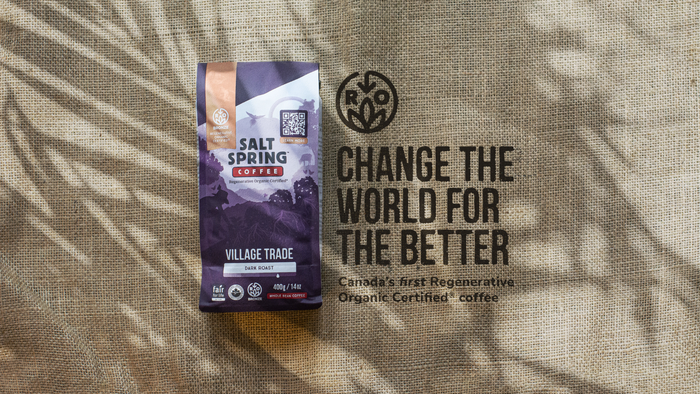
How are you incorporating regenerative agriculture into your product line?
MM: We’re getting ready to launch in the U.S. We’re going to have four SKUs that are 100% regenerative agriculture. So, anything in the U.S. will be 100% regenerative agriculture. In Canada, it’s going to be a little bit slower process because we need to convert what we have. Our first U.S. market placement will be at 100 Sprouts stores on March 25, and then all Whole Foods Markets in the Pacific Northwest in May. We are also in the final stages of discussions with Kroger, but nothing firm yet.
There has been a growing interest in our ROC coffees, with several other banners interested. We feel confident that we will get lots of deals confirmed at Expo West.
How did you decide to become a zero-waste company by 2026?
MM: Being a company that cares about things, we looked at what we could do that would be relatively easy to achieve. Waste is a big one because every day it’s there. We partnered with a local recycling-alternative company that was able to set up different channels that go into different recycling streams instead of going into a dumpster. Intentional waste diversion gives products another life, and in a lot of ways, it can be cheaper.
What’s something you wish you would have known when you started Salt Spring Coffee more than 25 years ago?
MM: How difficult it would be to have a purpose-driven company. If we didn’t care, it’d be a lot easier to be in business and make money. Because we added all these extra layers.
I remember in the early years, trying to get coffee listed in grocery stores and talking to a coffee buyer who would say, “How am I supposed to sell it; it costs too much.” But the measuring stick is conventional [coffee]. Looking back, I would have put together more of a marketing plan. Some people put together a big marketing plan, raise millions of dollars and go to market. It’s either successful or it fails. But we chipped away and grew organically.
What do you hope to accomplish at Expo West this year?
MM: Last year, we went for the first time. It was a bit of an exploration trip. We were in the process of being Regenerative Organic Certified. We had a broker that was just getting on board. Now we have two distributors—we are working with KeHE and Whisha—and two confirmed store chains we’re going into in the U.S. We’ve come a long way in a year. We’re hoping for some great success, and I’m sure it will be.
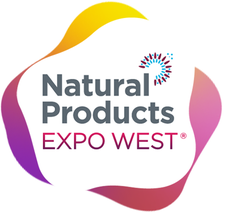
Salt Spring Coffee will exhibit in Booth F42 at the Fresh Ideas Organic Marketplace from 11 a.m. to 4 p.m. Wednesday, March 13, in the white tent near the Marriott. It also will exhibit in Booth # 1856 in Hall B and be listed on the Beacon Discovery platform.
Visit the website for more information about Natural Products Expo West or registration information.
About the Author(s)
You May Also Like




